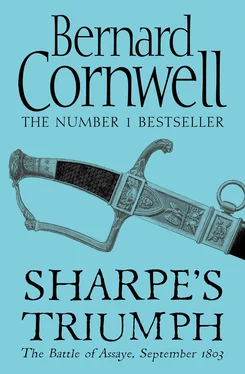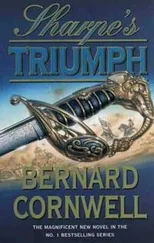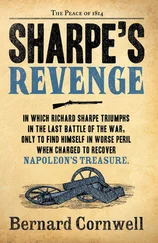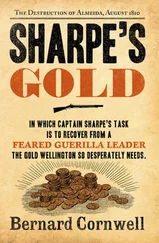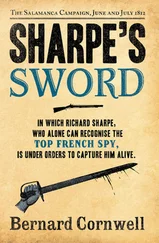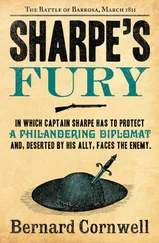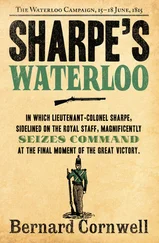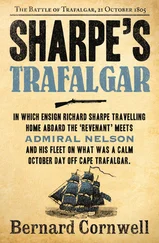‘So what do we do, sir?’ Sharpe asked.
‘We go in behind the assault, Sharpe, and beseech Almighty God that our ladder parties do get into the city. And once we’re inside we hunt for Dodd. That’s our job.’
‘Yes, sir,’ Sharpe said.
‘And once we have the traitor we take him to Madras, put him on trial and have him hanged,’ McCandless said with satisfaction, as though the job was as good as done. His gloomy forebodings of the previous night seemed to have vanished. He had stopped at a bare patch of ground. ‘This looks like a fair billet. No more rain in the offing, I think, so we should be comfortable.’
Like hell, Sharpe thought. A bare bed, no rum, a fight in the morning, and God only knew what kind of devils waiting across the wall, but he slept anyway.
And woke when it was still dark to see shadowy men straggling past with long ladders across their shoulders. Dawn was near and it was time for an escalade. Time for ladders and murder.
Sanjit Pandee was Killadar of the city, which meant that he commanded Ahmednuggur’s garrison in the name of his master, Dowlut Rao Scindia, Maharajah of Gwalior, and in principle every soldier in the city, though not in the adjacent fortress, was under Pandee’s command. So why had Major Dodd ejected Pandee’s troops from the northern gatehouse and substituted his own men? Pandee had sent no orders, but the deed had been done anyway and no one could explain why, and when Sanjit Pandee sent a message to Major Dodd and demanded an answer, the messenger was told to wait and, so far as the Killadar knew, was still waiting.
Sanjit Pandee finally summoned the courage to confront the Major himself. It was dawn, a time when the Killadar was not usually stirring, and he discovered Dodd and a group of his white-coated officers on the southern wall from where the Major was watching the British camp through a heavy telescope mounted on a tripod. Sanjit Pandee did not like to disturb the tall Dodd who was being forced to stoop awkwardly because the tripod was incapable of raising the glass to the level of his eye. The Killadar cleared his throat, but that had no effect, and then he scraped a foot on the firestep, and still Dodd did not even glance at him, so finally the Killadar demanded his explanation, though in very flowery terms just in case he gave the Englishman offence. Sanjit Pandee had already lost the battle over the city treasury which Dodd had simply commandeered without so much as a by-your-leave, and the Killadar was nervous of the scowling foreigner.
‘Tell the bloody man,’ Dodd told his interpreter without taking his eye from the telescope, ‘that he’s wasting my bloody time. Tell him to go and boil his backside.’
Dodd’s interpreter, who was one of his younger Indian officers, courteously suggested to the Killadar that Major Dodd’s attention was wholly consumed by the approaching enemy, but that as soon as he had a moment of leisure, the Major would be delighted to hold a conversation with the honoured Killadar.
The Killadar gazed southwards. Horsemen, British and Indian, were ranging far ahead of the approaching enemy column. Not that Sanjit Pandee could see the column properly, only a dark smudge among the distant green that he supposed was the enemy. Their feet kicked up no dust, but that was because of the rain that had fallen the day before. ‘Are the enemy truly coming?’ he enquired politely.
‘Of course they’re not bloody coming,’ Dodd said, standing upright and massaging the small of his back. ‘They’re running away in terror.’
‘The enemy are indeed approaching, sahib,’ the interpreter said deferentially.
The Killadar glanced along his defences and was reassured to see the bulk of Dodd’s regiment on the firestep, and alongside them the robed figures of his Arab mercenaries. ‘Your regiment’s guns,’ he said to the interpreter, ‘they are not here?’
‘Tell the interfering little bugger that I’ve sold all the bloody cannon to the enemy,’ Dodd growled.
‘The guns are placed where they will prove most useful, sahib,’ the interpreter assured the Killadar with a dazzling smile, and the Killadar, who knew that the five small guns were at the north gate where they were pointing in towards the city rather than out towards the plain, sighed in frustration. Europeans could be so very difficult.
‘And the three hundred men the Major has placed at the north gate?’ Sanjit Pandee said. ‘Is it because he expects an attack there?’
‘Ask the idiot why else they would be there,’ Dodd instructed the interpreter, but there was no time to tell the Killadar anything further because shouts from the ramparts announced the approach of three enemy horsemen. The emissaries rode beneath a white flag, but some of the Arabs were aiming their long-barrelled matchlocks at the approaching horsemen and the Killadar quickly sent some aides to tell the mercenaries to hold their fire. ‘They’ve come to offer us cowle,’ the Killadar said as he hurried towards the south gate. Cowle was an offer of terms, a chance for the defenders to surrender rather than face the horrors of assault, and the Killadar hoped he could prolong the negotiations long enough to persuade Major Dodd to bring the three hundred men back from the north gate.
The Killadar could see that the three horsemen were riding towards the south gate which was topped by a squat tower from which flew Scindia’s gaudy green and scarlet flag. To reach the tower the Killadar had to run down some stone steps because the stretch of wall just west of the gate possessed no firestep, but was simply a high, blank wall of red stone. He hurried along the foot of the wall, then climbed more steps to reach the gate tower just as the three horsemen reined in beneath.
Two of the horsemen were Indians while the third was a British officer, and the three men had indeed come to offer the city cowle. If the Killadar surrendered, one of the Indians shouted, the city’s defenders would be permitted to march from Ahmednuggur with all their hand weapons and whatever personal belongings they could carry. General Wellesley would guarantee the garrison safe passage as far as the River Godavery, beyond which Pohlmann’s compoo had withdrawn. The officer finished by demanding an immediate answer.
Sanjit Pandee hesitated. The cowle was generous, surprisingly generous, and he was tempted to accept because no man would die if he took the terms. He could see the approaching column clearly now, and it looked to him like a red stain smothering the plain. There would be guns there, and the gods alone knew how many muskets. Then he glanced to his left and right and he saw the reassuring height of his walls, and he saw the white robes of his fearsome Arabs, and he contemplated what Dowlut Rao Scindia would say if he meekly surrendered Ahmednuggur. Scindia would be angry, and an angry Scindia was liable to put whoever had angered him beneath the elephant’s foot. The Killadar’s task was to delay the British in front of Ahmednuggur while Scindia gathered his allies and so prepared the vast army that would crush the invader. Sanjit Pandee sighed. ‘There can be no cowle,’ he called down to Wellesley’s three messengers, and the horsemen did not try to change his mind. They just tugged on their reins, spurred their horses and rode away. ‘They want battle,’ the Killadar said sadly, ‘they want loot.’
‘That’s why they come here,’ an aide replied. ‘Their own land is barren.’
‘I hear it is green,’ Sanjit Pandee said.
‘No, sahib, barren and dry. Why else would they be here?’
News spread along the walls that cowle had been refused. No one had expected otherwise, but the Killadar’s reluctant defiance cheered the defenders whose ranks thickened as townsfolk climbed to the firestep to see the approaching enemy.
Читать дальше
